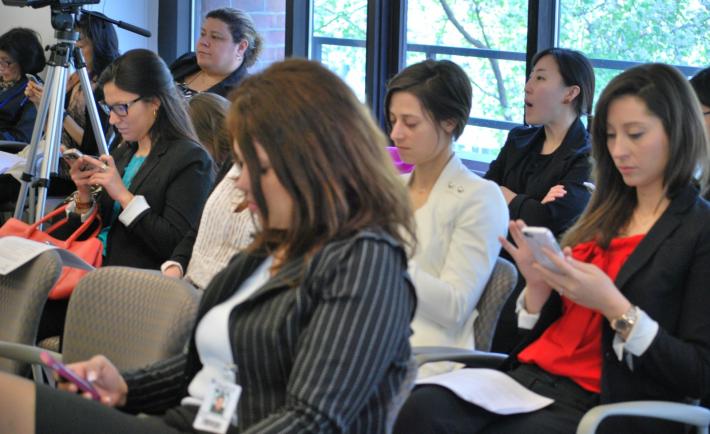
Young women are the future of politics, but we have to protect them from violence, including online.
Communication technologies are having a significant impact on the way we practice democracy around the world. Online platforms are an exciting and expanding space for citizens to gather information and voice their opinions. They offer new opportunities for politicians and their constituents to connect, and for young women and men and other new entrants to politics to cost-effectively find a voice and build their political networks. However, these platforms can also be a forum for misinformation, hate speech, abuse and harassment.
Paradoxically, the misuse -- by states, organizations and individuals -- of the very freedoms that the information space is supposed to enable, has become the greatest threat to its integrity. Cyber-bullying, propaganda and unaccountable intermediaries are real, and the biases of the coders who control and regulate online platforms have become hot topics. But for NDI, the chilling impact that these have on the ambitions of young women to enter politics is of particular concern.
In the year since we launched our #NotTheCost global call to action against the violence that women in politics face, we have seen and heard powerful testimonies by women speaking of their own experience of the threats, harassment and sometimes physical attacks they have endured simply for participating in political spaces or public debates. A recent study by the Inter-Parliamentary Union noted that 80 percent of women parliamentarians reported that they had been targeted by psychological attacks online, including “threats of death, rape, beatings or abduction.” One common theme emerging in all the reports and debates about this violence has been the impact it has on the next generation of women leaders. Research shows that violence against high-profile female politicians has widespread negative effects on women who might otherwise enter politics, and on young women in particular.
In 2014, the National Democratic Institute surveyed 1,160 politically active women about their use of digital technologies but didn’t ask about their experience of abuse or violence online. In 2017, we would not make that omission again. Increasingly, attacks against politically-active women are being channeled online, where harassment can be anonymized, develop a mob dynamic - sometimes transnationally - and undermine a woman’s sense of personal security in ways not experienced by men. “The worst thing about it for me,” said UK Parliamentarian Jess Phillips, describing receiving 600 rape threats via social media in one night, “is when other young women speak to me [...] they too have to face the viral attacks.” Pew Research Center has reported that while young women and men experience the most severe types of online harassment, young women from 18-24 experience these types of harassment at disproportionately higher levels than young men.
Breakthrough research by The Guardian newspaper on its own comments threads demonstrated that articles written by women attract more abuse and trolling than those written by men, regardless of topic. In this way, online abuse and harassment leads to women’s self-censorship and withdrawal from public discourse, and represents a direct barrier to women’s free speech, undermining democracy in all its key elements: participation (down), representation (constrained), transparency (circumvented), and accountability (denied, some would say refused).
Online spaces are also becoming a locus for authoritarian and anti-democratic propaganda published by states and non-state actors, often acting transnationally. This propaganda is used to close the opportunity for citizens to engage in free and meaningful dialogues and to access accurate information. Some of it is politically motivated, designed to control political space and lending itself to new tactics of repression globally. But much of the vitriol and misinformation online is also rooted in patriarchy and intolerance, and to violent narratives flowing from these views. Tom Carothers notes that, especially where a conservative social agenda is part of authoritarian positioning, negative social norms relating to gender equality limit the space for women’s political participation. In fear of further harms, and in the face of an industry struggling to respond in ways that protect women, prevent violence and prosecute perpetrators, it is no surprise that many women are choosing to opt out of leadership or political debates.
All sexual and gender-based violence - in person and online - is a clear abuse of human rights, and it must be stopped. Taking action to do so will require a number of different interventions, including demanding more accountability from the digital community, agreeing on norms for a free and open internet and taking steps to write systemic biases and inequalities out of algorithms and codes. We also need to collect more and better data on the roots and causes of violence against politically active women, which is why this past year NDI, in consultation with the UN Special Rapporteur on Violence Against Women, launched an Incident Report Form to collect the testimonies of political women affected by violence - wherever it occurs.
The theme of our 2017 International Women’s Day video was #InspiretheNextGen, and we focused on exactly that. From Jordan to Nicaragua to the Central African Republic, we work with young women advocating on local issues like street lighting, bridging communities to achieve reconciliation and running for office. Young women need to be able to take advantage of the opportunities, efficiencies and reach of online platforms and the internet to engage in politics and the public decision-making that affects their lives - in their own voice and conscience, without fear or threat of reprisal. The internet is for everyone and it’s their world too. Isn’t it?
